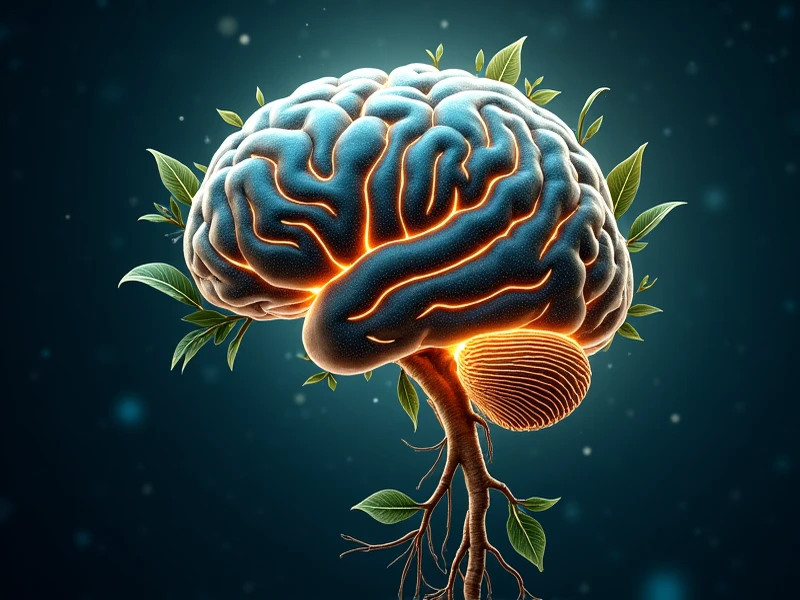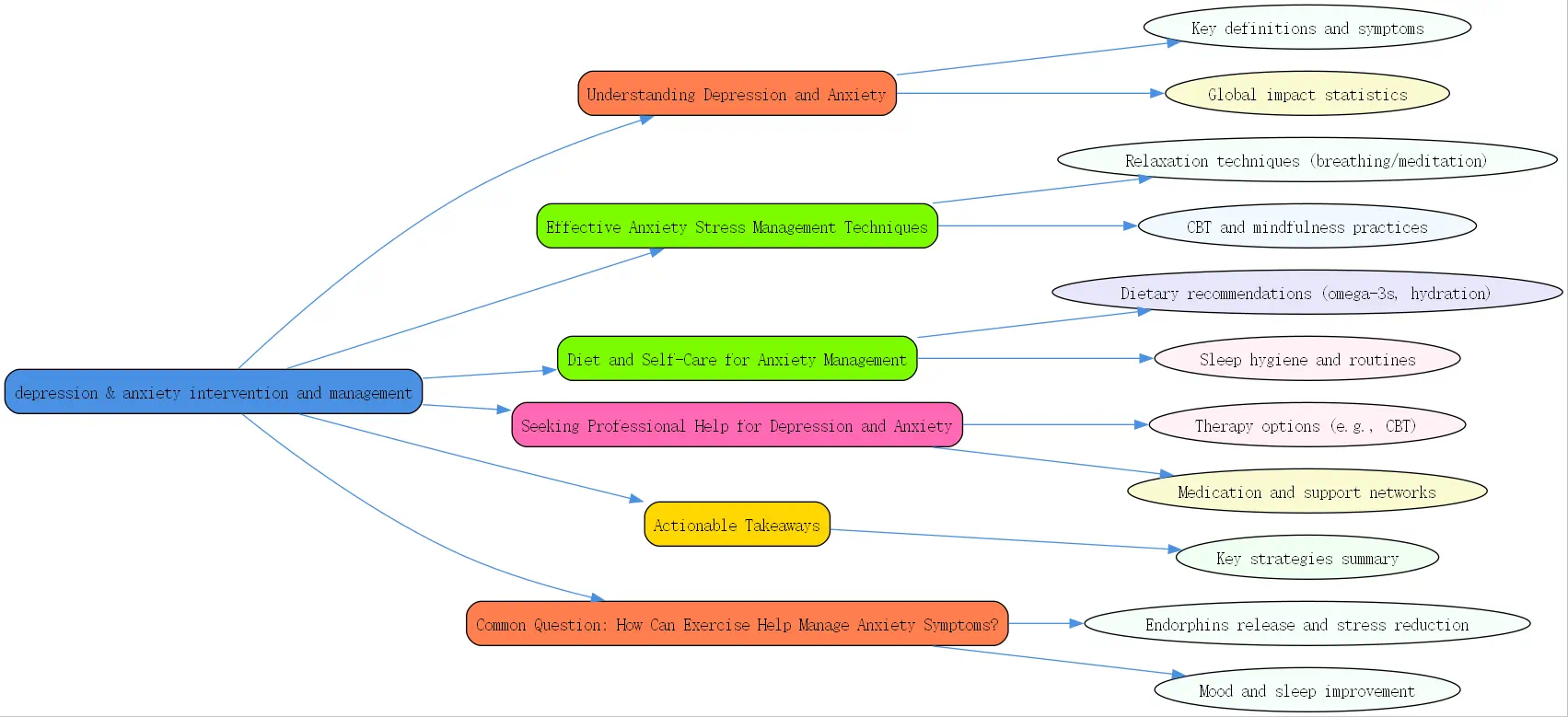Depression & Anxiety Intervention and Management: A Comprehensive Guide


Mental health challenges like depression and anxiety affect millions worldwide, influencing everything from personal relationships to professional aspirations. If left unmanaged, these conditions can interfere with your ability to thrive. Fortunately, there are techniques and tools available to help alleviate anxiety and depression鈥攁nd improve overall well-being.
At BrainTalking, we’re dedicated to providing clear, actionable strategies backed by research and personal testimonies. Let’s explore how you can better manage stress and anxiety while building resilience and emotional stability.
Understanding Depression and Anxiety
Defining Depression and Anxiety: Recognizing the Signs
Depression and anxiety are two of the most common mental health challenges. Depression is characterized by persistent feelings of sadness, a lack of motivation, or low energy levels. Anxiety, on the other hand, often manifests as excessive worry, stress, or tension. Both conditions can coexist, forming a vicious cycle if untreated.
Recognizing these signs early is vital for intervention and management. Symptoms such as insomnia, irritability, fatigue, and difficulty concentrating may indicate a need for lifestyle changes or professional guidance.
The Impact of Anxiety on Daily Life: Work, Relationships, and Goals
Unchecked anxiety can negatively influence various aspects of life, including work productivity, personal connections, and the ability to set and achieve goals. The constant feelings of unease or panic can make even the smallest tasks overwhelming, creating roadblocks to personal fulfillment and success.

Prevalence of Anxiety: A Global Mental Health Challenge
According to the World Health Organization (WHO), anxiety affects more than 260 million people worldwide, making it a significant mental health concern. Despite its prevalence, anxiety is manageable with the right interventions, techniques, and support systems.
Effective Anxiety Stress Management Techniques
When it comes to managing depression and anxiety effectively, a combination of lifestyle adjustments and targeted techniques can make a world of difference.
Lifestyle Adjustments for Depression and Anxiety Management
Quality Sleep: The Foundation of Mental Wellness
You may underestimate the power of a good night’s sleep, but it is foundational to managing anxiety and depression. Poor sleep raises cortisol levels鈥攖he stress hormone that exacerbates anxiety. Conversely, restful sleep lowers cortisol, enhances mood, and helps you feel more emotionally resilient.
Quality sleep also improves focus and cognitive functions, which are often impaired by anxiety. By promoting relaxation and reducing tension, consistent restorative sleep becomes a cornerstone of depression and anxiety intervention and management strategies.
Exercise and Anxiety Management: Releasing Endorphins
Physical activity has profound mental health benefits. Exercise encourages the release of endorphins, the brain’s natural “”feel-good”” chemicals, which combat stress and boost overall well-being. Regular exercise also reduces cortisol levels, similar to quality sleep.
Another significant benefit of exercising is its ability to redirect your focus away from anxious thoughts. Whether it’s yoga, running, or weightlifting, incorporating movement into your routine fosters relaxation, enhances self-confidence, and reduces emotional stress.
Deep Breathing Exercises
Practicing deep breathing may sound simplistic, but it’s an incredible stress-relief tool. Controlled breathing lowers your heart rate, blood pressure, and muscle tension鈥攁ll key physiological contributors to anxiety.
Furthermore, practicing deep breathing redirects your attention, reducing the intensity of anxious thoughts. This technique also combats fatigue, a frequent symptom of depression, by improving oxygen flow to your brain.
Setting Realistic Goals
Setting achievable, realistic goals is a transformative way to manage anxiety. Unrealistic objectives often lead to feelings of overwhelm, while manageable goals reduce pressure and restore a sense of control.
When you accomplish realistic goals, the resulting sense of achievement boosts self-esteem and helps you maintain emotional stability. By focusing on attainable milestones, you enhance your problem-solving skills and reduce negative self-talk, paving the way for mental wellness.
Diet and Self-Care for Anxiety Management
Targeted changes in diet and self-care can significantly impact your ability to manage depression and anxiety symptoms effectively.
Balanced Diet: Nourishing Body and Mind
The connection between a balanced diet and mental health is undeniable. Regulating blood sugar levels through proper nutrition helps prevent irritability and tension鈥攃ommon precursors to anxiety.
Gut health, linked to brain health, also plays a pivotal role. Consuming fiber-rich foods and probiotics promotes gut balance, reducing inflammation and alleviating anxiety symptoms. Additionally, sustained energy from whole grains and leafy greens can reduce daily fatigue and stress triggers.
Minimizing caffeine, alcohol, and drug consumption is crucial for anxiety management. These substances can exacerbate mental health challenges, disrupt sleep patterns, and lead to dependency. Reducing them opens pathways for healthier daily functioning.
The Power of Self-Care: Yoga, Meditation, and Relaxation
Self-care activities such as yoga and meditation integrate physical and mental wellness practices into your routine. These interventions lower tension levels, improve physical health, and promote emotional calm.
Self-care also boosts self-confidence, empowering you to take greater control of your anxiety symptoms. Activities like taking a warm bath or listening to soothing music can relax your mind, restore balance, and enhance your sense of control.
Practicing Gratitude
Regularly practicing gratitude provides a new lens through which to view your life. Focusing on positive aspects instead of negative emotions fosters optimism. Gratitude also increases your resilience, helping you adapt to challenges more effectively.
Acknowledging and appreciating the supportive people in your life reinforces emotional security. This social connection provides a healthy buffer against feelings of isolation often tied to anxiety and depression.
Seeking Professional Help for Depression and Anxiety
When lifestyle adjustments aren’t enough, seeking professional help can be a game-changer in depression and anxiety intervention and management.

The Role of Therapy: A Path to Mental Wellness
Speaking with a therapist allows you to uncover triggers, develop targeted coping strategies, and explore root causes of depression and anxiety. Therapy sessions encourage self-reflection and provide tools to overcome emotional hurdles effectively.
Benefits of Online Therapy: Accessibility and Convenience
Services like BetterHelp have revolutionized mental health care by offering affordable and accessible therapy online. With thousands of licensed therapists available, platforms like BetterHelp ensure tailored professional care without geographical barriers.
Finding the Right Therapist: A Personalized Approach
Matching with the right therapist is essential for successful mental health care. Platforms allow for personalization based on individual needs, providing a custom-fit approach to address your unique challenges. Accessibility and flexibility鈥攖hrough video calls, messaging, or phone sessions鈥攅nsure comfort and convenience for anyone seeking support.
Actionable Takeaways
- Prioritize quality sleep to reduce cortisol and strengthen emotional resilience.
- Incorporate regular exercise into your weekly routine for mental and physical benefits.
- Practice deep breathing exercises to alleviate physical symptoms of anxiety.
- Set realistic goals to reduce stress and maintain focus on achievable milestones.
- Improve your diet by consuming nutrient-rich foods and minimizing caffeine and alcohol intake.
- Engage in self-care practices like yoga, relaxation techniques, and gratitude exercises for calm and stability.
- Seek professional therapy when necessary to address unresolved challenges.
Common Question: How Can Exercise Help Manage Anxiety Symptoms?
Answer:
Exercise is one of the most effective tools for managing anxiety symptoms. Physical activity influences the release of endorphins鈥攏atural chemicals in the body designed to lift mood and foster emotional balance. Exercise also reduces stress hormone levels like cortisol, promoting relaxation.
Additionally, exercise serves as a positive distraction, guiding your focus away from anxious thoughts. Improved physical fitness also boosts self-esteem and mental clarity. Whether walking, swimming, or engaging in yoga, regular activity is a proven method for anxiety stress management techniques.




